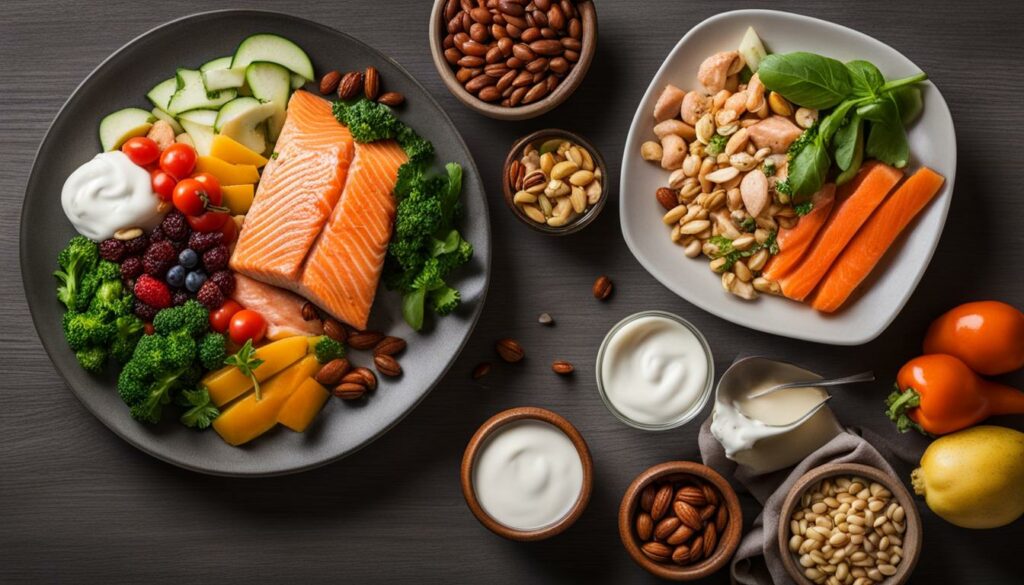Are you struggling with hormonal imbalances? Hormones play a crucial role in our overall well-being, affecting appetite, weight, mood, and more. Achieving hormonal balance naturally is possible through lifestyle practices and remedies.
In this article, we will explore effective strategies for balancing hormones and promoting a harmonious body.
Key Takeaways:
- Implementing natural remedies and lifestyle changes can help regulate hormone levels.
- Include hormone-balancing foods such as protein-rich sources like eggs and chicken breast in your diet.
- Engage in regular exercise, including high-intensity interval training and strength training.
- Maintain a moderate weight and take care of the gut health by following a high fiber diet.
- Reduce sugar intake and practice stress reduction techniques like meditation and yoga.
The Role of Protein in Hormone Balance
Consuming adequate amounts of protein is crucial for maintaining hormone balance in your body. Protein provides essential amino acids that are necessary for the production of protein-derived hormones.
These hormones play a crucial role in regulating various physiological processes, including growth, energy metabolism, appetite control, stress response, and reproduction.
Research has shown that including protein in your diet can have a significant impact on hormone regulation. One notable effect is the reduction of the hunger hormone ghrelin. By consuming protein-rich foods, you can decrease levels of ghrelin in your body, helping to control your appetite and manage food cravings.
In addition to reducing ghrelin, protein consumption also stimulates the production of hormones that promote a feeling of fullness.
Peptide YY (PYY) and glucagon-like peptide-1 (GLP-1) are two hormones that are released in response to protein intake. These hormones help to signal satiety and increase the sensation of fullness, aiding in appetite control.
Incorporating high protein foods into your meals can significantly contribute to achieving hormonal balance. Foods such as eggs, chicken breast, lentils, and fish are excellent sources of protein that can help regulate hormone levels and support overall hormonal health.
Include protein-rich foods in your hormone balance diet to optimize hormonal function and promote appetite control.

Benefits of Protein in Hormone Balance:
- Reduces levels of the hunger hormone ghrelin
- Stimulates the production of fullness hormones PYY and GLP-1
- Aids in appetite control and managing food cravings
- Supports overall hormonal health and balance
The Importance of Exercise for Hormone Balance
Regular exercise plays a significant role in achieving hormonal balance. Physical activity has numerous benefits, including improving blood flow to the muscles and increasing hormone receptor sensitivity, which enhances the delivery of nutrients and hormone signals throughout the body.
One important aspect of exercise is its ability to reduce insulin levels and increase insulin sensitivity. This is crucial for maintaining stable blood sugar levels and preventing insulin resistance, a condition that can lead to hormonal imbalances and health complications.
Exercise also plays a vital role in boosting levels of muscle-maintaining hormones that tend to decline with age, such as testosterone, IGF-1, DHEA, and growth hormone (HGH). These hormones are essential for maintaining muscle mass, strength, and overall physical well-being.
There are various types of physical activity that can help achieve hormonal balance. High-intensity interval training (HIIT) is an effective method that combines short bursts of intense exercise with periods of rest. HIIT has been shown to improve insulin sensitivity and promote fat burning.
Strength training, such as weightlifting, is another hormone-balancing exercise. It helps build muscle mass, boosts metabolism, and increases hormone production. Engaging in regular strength training can have a significant impact on hormonal health.
In addition to HIIT and strength training, cardiovascular exercises like running, cycling, or swimming can also contribute to hormone balance. These activities improve cardiovascular health, reduce inflammation, and release endorphins, promoting a sense of overall well-being.
Even simple activities like walking can have a positive impact on hormone levels. Regular walking has been shown to increase key hormones, improve insulin sensitivity, and enhance strength and quality of life.
By incorporating a variety of hormone balance exercises into your routine, you can optimize your hormonal health, enhance physical performance, and improve overall well-being.
Lifestyle Factors Affecting Hormone Balance
Maintaining a moderate weight is essential for hormone balance. Excess weight gain has been linked to hormonal imbalances, which can increase the risk of insulin resistance and reproductive health complications. To achieve a moderate weight, it is important to focus on a healthy diet and regular physical activity.
Taking care of gut health is also a crucial factor in achieving hormone balance. The gut microbiome plays a significant role in regulating hormones, particularly by modulating insulin resistance.
To support a healthy gut, prioritize consuming probiotic-rich foods like yogurt and fermented vegetables, as well as incorporating foods high in fiber.
Lowering sugar intake is another key strategy for balancing hormones. Excessive sugar consumption can lead to insulin resistance, disrupting hormonal balance. Opt for natural sweeteners like stevia or honey, and reduce your intake of processed foods and sugary beverages.
Stress reduction techniques are essential for hormonal balance. Chronic stress can lead to elevated cortisol levels, which can disrupt hormone production and regulation. Engaging in activities such as meditation, yoga, and listening to relaxing music can help lower cortisol levels and promote hormonal equilibrium.
Consuming healthy fats is vital for hormone balance. Healthy fats, such as those found in avocados, nuts, and olive oil, provide essential nutrients for hormone production and regulation. Including these fats in your diet can help support hormonal balance.
Additionally, following a high fiber diet is beneficial for hormone balance. High fiber foods like vegetables, whole grains, and legumes help promote healthy digestion and regular bowel movements, which can optimize hormone metabolism and elimination.

Key Takeaways:
- Maintaining a moderate weight supports hormone balance.
- Take care of gut health to regulate hormones efficiently.
- Lower sugar intake to minimize the risk of insulin resistance.
- Use stress reduction techniques to lower cortisol levels.
- Include healthy fats in your diet to support hormone production.
- Follow a high fiber diet to optimize hormone metabolism.
Conclusion
Achieving hormonal balance naturally is possible through a combination of effective strategies. By incorporating natural remedies and implementing key lifestyle changes, you can regulate hormone levels and promote overall well-being.
A nutritious diet plays a crucial role in hormone balance. Ensure you consume a variety of nutrient-dense foods, including lean proteins, whole grains, fruits, and vegetables. Additionally, prioritize regular exercise to enhance hormone receptor sensitivity and improve insulin levels.
To maintain hormonal balance, it is important to adopt lifestyle factors that support gut health and reduce stress levels. Pay attention to your gut microbiome by incorporating high-fiber foods and healthy fats into your diet. Implement stress reduction techniques like meditation and yoga to lower cortisol levels.
By following these strategies – incorporating a hormone-balancing diet, engaging in regular exercise, maintaining a healthy weight, taking care of gut health, managing stress levels, and consuming nutrient-rich foods – you can support hormonal health and achieve a balanced and harmonious body.
FAQ
What are some natural remedies to balance hormones?
Some natural remedies to balance hormones include incorporating a nutritious diet, regular exercise, maintaining a moderate weight, taking care of gut health, reducing sugar intake, managing stress levels, consuming healthy fats, and following a high fiber diet.
Are there any hormone balance supplements available?
Yes, there are hormone balance supplements available in the market. However, it’s important to consult with a healthcare professional before starting any new supplements to ensure they are safe and suitable for your specific needs.
Are there any herbal remedies for hormonal imbalance?
Yes, there are various herbal remedies that can help balance hormones naturally. Some popular options include maca root, chasteberry, black cohosh, and evening primrose oil. However, it’s essential to consult with a healthcare professional before trying any herbal remedies.
How does a hormone balancing diet work?
A hormone balancing diet focuses on consuming a balanced amount of macronutrients, including protein, healthy fats, and complex carbohydrates. It also emphasizes whole foods, such as fruits, vegetables, lean proteins, and whole grains, while limiting processed foods, refined sugars, and unhealthy fats.
Which hormone balancing herbs are commonly used?
Some commonly used hormone balancing herbs include maca root, chasteberry, black cohosh, evening primrose oil, and dong quai. These herbs have been traditionally used to support hormonal health, but it’s important to consult with a healthcare professional before using them.
What are some natural ways to regulate hormones?
Some natural ways to regulate hormones include maintaining a healthy lifestyle, including regular exercise, eating a balanced diet, managing stress levels, and getting enough sleep. It’s important to adopt a holistic approach to hormonal health.
What are some hormone balance tips?
Some hormone balance tips include eating enough protein at every meal, engaging in regular exercise, maintaining a moderate weight, taking care of gut health, reducing sugar intake, managing stress levels, consuming healthy fats, and following a high fiber diet.
Can certain foods help balance hormones?
Yes, certain foods can help balance hormones. Foods that are rich in protein, healthy fats, fiber, and antioxidants, such as lean meats, fish, eggs, nuts, seeds, fruits, vegetables, and whole grains, can support hormonal balance and overall well-being.
What lifestyle factors can affect hormone balance?
Lifestyle factors that can affect hormone balance include maintaining a moderate weight, taking care of gut health, reducing sugar intake, managing stress levels, consuming healthy fats, following a high fiber diet, and engaging in regular exercise.
Are there any specific exercises that can help with hormone balance?
Yes, certain exercises can help with hormone balance. Both cardio exercises and strength training can be beneficial for hormone balance. Exercises like high-intensity interval training, weightlifting, and activities that increase muscle mass can help regulate hormones and improve overall health.




